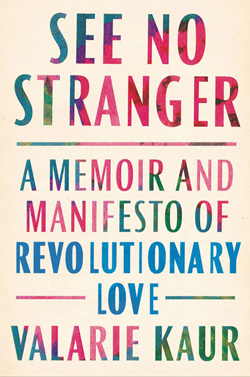Study Guide: Valerie Kaur
Biography
Valerie Kaur was born and raised in Clovis, California, where her family settled as Sikh farmers in 1913.
Kaur earned a Bachelor of Arts degree in Religious Studies and International Relations from Stanford University, a Master of Arts in Theological Studies from Harvard Divinity School, and a Juris Doctor from Yale Law School. She is a member of the California Bar.
Efforts
When a family friend, Balbir Singh Sodhi, was the first person killed in a hate crime after September 11, 2001, Kaur began to document hate crimes against Sikh and Muslim Americans, which resulted in the award-winning documentary film Divided We Fall: Americans in the Aftermath.
Since then, she has made films and led story-based campaigns on hate crimes, racial profiling, immigration detention, solitary confinement, marriage equality, and Internet freedom. She is the founder of Groundswell Movement, considered “America’s largest multifaith online organizing network”, recognized for “dynamically strengthening faith-based organizing in the 21st century.”
She is also co-founder of Faithful Internet which organizes people of faith to protect net neutrality.
She is currently the founder and director of the Revolutionary Love Project, a non-profit that produces tools, curricula and mass mobilizations aimed at reclaiming love as a force for justice.
Forgiveness is not forgetting,
forgiveness is freedom from hate.
Kaur’s film making and activism have focused on gun violence prevention, racial profiling, immigration detention and prison practices, and Internet neutrality. Her activism has also included education work to combat hate crimes against Muslim and Sikh Americans. She founded the Yale Visual Law Project to inspire and equip new generations of advocates.
Kaur served as the Media and Justice Fellow at Stanford Law School’s Center for Internet and Society and Senior Fellow at Auburn Theological Seminary. Kaur has given speeches at the White House, The Pentagon, and the Parliament of the World’s Religions.
Kaur has frequently collaborated with her husband and creative partner, Sharat Raju. Together the two have produced several documentary films, including Stigma (2011) about the impact of New York City police’s Stop and Frisk policy, Alienation (2011) about immigration raids,The Worst of the Worst: Portrait of a Supermax (2012) about solitary confinement in prison, and Oak Creek: In Memorium (2012) about the Wisconsin Sikh temple shooting.
Tending to the wound is not healing it;
only they can do that.
In 2020, Kaur’s debut book, See No Stranger: A Memoir and Manifesto of Revolutionary Love was published.
Shortly after the 2016 U.S. presidential election, Kaur delivered a Watch Night address that went viral with over 30 million views worldwide. In 2017, she delivered a TED Talk entitled “3 Lessons of Revolutionary Love in a Time of Rage.”
Recognition
- The Center for American Progress named her, “a standout figure in the world of interfaith organizing and activism.”
- In 2012, she received the American Courage Award by Asian Americans Advancing Justice.
- In 2013, she was named a “Person of the Year” by India Abroad.
- In 2013, she was named one of eight Asian American “Women of Influence” by Audrey Magazine
- In 2015, she was recognized as a “Young Global Leader” by the World Economic Forum.
- In 2016, Harvard Divinity School awarded her the Peter J. Gomes Memorial Honor.
Wikipedia: https://en.wikipedia.org/wiki/Valarie_Kaur
Valerie Kaur Speaking at the National Moral Revival Watch Night Service
Flimmaker, activist and mother Valarie Kaur connects her own family history with the current debate around immigration, hate crimes and terrorism in a powerful and moving speech on New Year’s Eve that has since gone viral.



